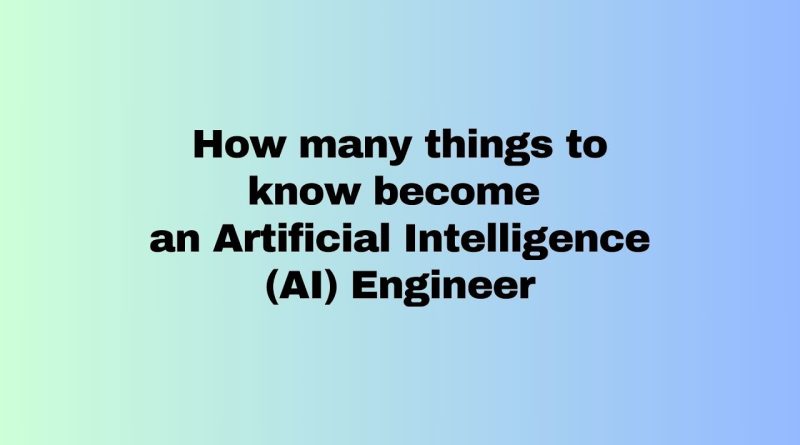How many things to know become an Artificial Intelligence AI Engineer
Becoming an Artificial Intelligence (AI) Engineer involves acquiring a diverse set of skills and knowledge in various domains. Here is a comprehensive description of the key areas and things you need to know to pursue a career as an AI Engineer:
Programming Languages:
Proficiency in languages such as Python, Java, or C++ is essential. Python is particularly popular in the AI community due to its simplicity and a rich ecosystem of libraries and frameworks.
Mathematics and Statistics:
A strong foundation in mathematics, including linear algebra, calculus, probability, and statistics, is crucial for understanding the algorithms and models used in AI.
Machine Learning (ML) and Deep Learning:
Understanding fundamental machine learning concepts, algorithms, and techniques is essential. Deep learning, a subset of ML, involves neural networks and is widely used in modern AI applications.
Data Handling and Preprocessing:
Skills in collecting, cleaning, and preprocessing data are vital. AI Engineers need to work with large datasets and ensure they are suitable for training models.
Data Structures and Algorithms:
Proficiency in data structures and algorithms is necessary for efficient problem-solving and optimizing AI algorithms.
Computer Vision:
Knowledge of computer vision is crucial for AI Engineers working on tasks such as image recognition, object detection, and video analysis.
Natural Language Processing (NLP):
For AI applications involving language understanding, sentiment analysis, and chatbots, knowledge of NLP is essential.
Reinforcement Learning:
Understanding reinforcement learning is important for AI Engineers working on applications that involve decision-making in dynamic environments, such as robotics and game playing.
AI Frameworks and Libraries:
Familiarity with popular AI frameworks and libraries like TensorFlow, PyTorch, and scikit-learn is necessary for implementing and deploying machine learning models.
Big Data Technologies:
Knowledge of big data technologies, such as Apache Hadoop and Spark, is important for handling and processing large datasets.
Cloud Computing:
Many AI applications are deployed on cloud platforms. Familiarity with cloud services like AWS, Azure, or Google Cloud is beneficial.
Model Deployment and Integration:
Understanding how to deploy models into production environments and integrate them with other systems is crucial for real-world applications.
Ethics and Responsible AI:
Awareness of ethical considerations and responsible AI practices is essential for creating AI solutions that align with societal values and norms.
Continuous Learning:
AI is a rapidly evolving field, and staying updated on the latest research, technologies, and industry trends is crucial for an AI Engineer.
Communication Skills:
Effective communication is vital for explaining complex AI concepts to non-technical stakeholders and collaborating with interdisciplinary teams.
Ayesha Akter Chandni
Instructor of Computer Science and Engineering
B.Sc(CSE),M.Sc(CSE)
CCNA, CCNP, RHCSA, RHCE, RHCVA,
RedHat OpenStack-200,
Server Security & Hardening -413.
# AI_Frameworks_ Libraries #Programming #Artificial_Intelligence (AI)
by Hello IT World
redhat openstack



